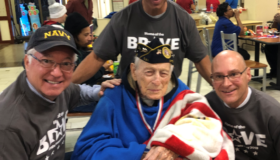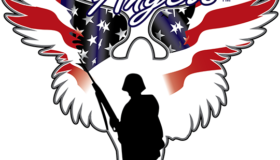Nonprofit Leaders: Celebrating the Women Who Keep Soldiers’ Angels Going Strong
March 11, 2021
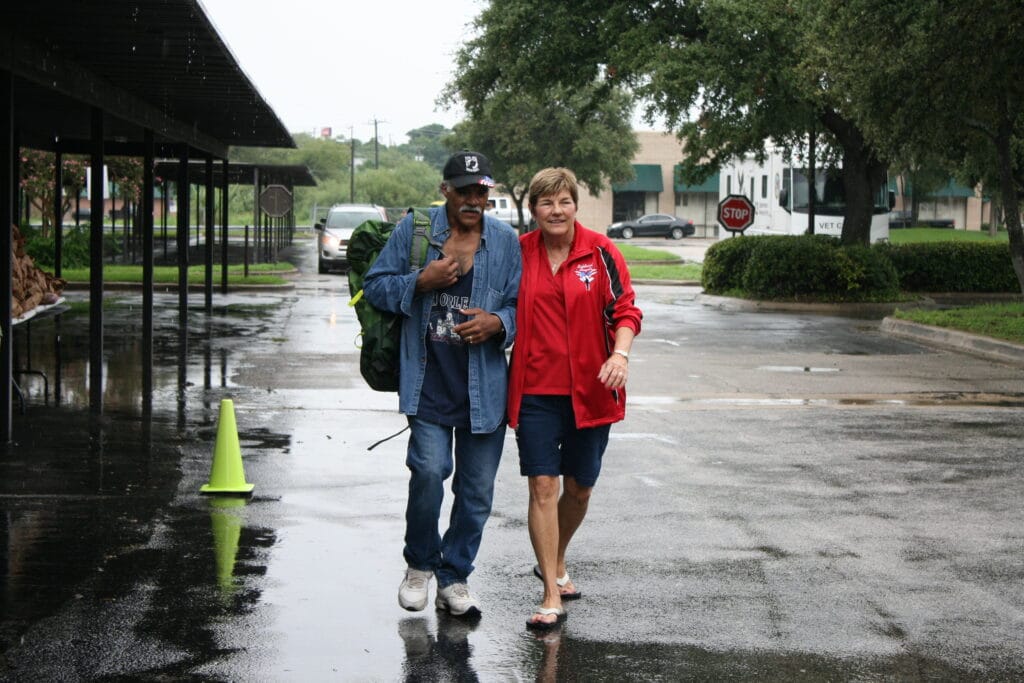
International Women’s Day was Monday, March 8, and all March long it’s Women’s History Month. Here at Soldiers’ Angels, we have so many incredible women who became nonprofit leaders because of their passion for giving back and bringing others along with them. While we have a number of women in leadership roles within our organization, we chose to highlight a handful who have been with us for over five years.
“Passion is energy. Feel the power that comes from focusing on what excites you.”
– Oprah Winfrey
Amy Palmer
Amy Palmer took over the organization in October of 2013. When founder Patti Patton-Bader decided it was time to retire, she reached out to Amy personally and asked her to take the lead so that the organization could continue its work. Amy had 10 years of experience serving in leadership roles in the nonprofit realm. After doing a number of evaluations, interviewing volunteers, and the people we serve, she was overwhelmed with the level of commitment to the work Soldiers’ Angels does. The amount of passion she found is what ultimately led Amy to stay and take on the role of President and CEO. We are so grateful for her wisdom, leadership, and passion for serving others.
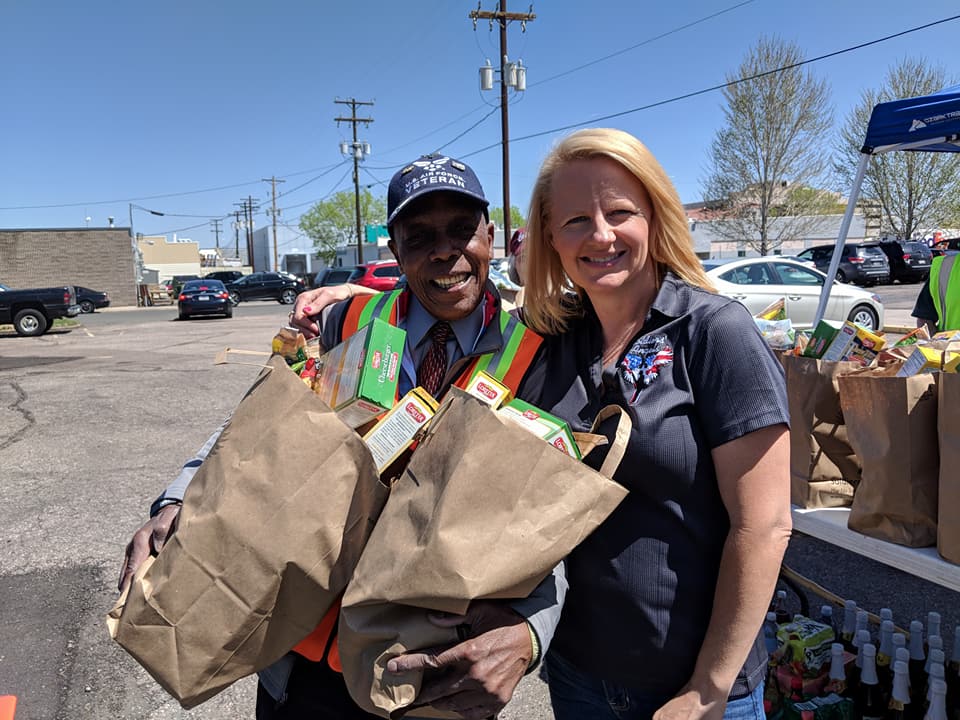
Did you serve in the military? If so, how long and what branch?
Yes, Air Force, 6 years, I was medically discharged due to a back injury.
What drew you to the work that you do and why do you think it’s important to serve the military community?
Going through the med board process made me appreciate what other Service Members go through. Luckily my husband, at the time, was active duty AF and I had a stable income but mine went to zero in 90 days. For the primary breadwinner, this could be devastating to a family. When I was active duty I was always the one soliciting for Combined Federal Campaign and soliciting raffle and gift items for the units holiday parties so it was a natural fit for me.
What characteristics do you think are important for a leader to have – specifically in the nonprofit world?
I think it’s important they run it like a business. Many people come to nonprofit work because of their passion and assume others will have it too. You have to be passionate about what you do but have to have the business knowledge to stay focused on core strengths. You can’t be all things for everyone.
Jennifer Cernoch, Vice President of Development
If you’ve ever partnered with Soldiers’ Angels, you know Jennifer very well. She is the reason Soldiers’ Angels corporate partnerships are fun and meaningful and has been doing it for 7 years. We honestly don’t know how she juggles all of it but she’s a pro and we don’t know what we’d do without her. Jennifer has been an activist her entire life and has worked in the nonprofit arena her entire career. Her focus shifted to the military after 9/11 and has been laser-focused on it ever since. Her leadership has been instrumental in growing our organization.

For me, serving the military community is essential. These brave men and women in uniform and their families sacrifice so much for our freedom.
– Jennifer Cernoch
Did you serve in the military? If so, how long and what branch?
No but my father served in WWII. He was in the Army and hit the beaches of Normandy and survived. He has always been my hero.
What drew you to the work that you do and why do you think it’s important to serve the military community?
Working in the nonprofit arena all of my career I felt that it was important to focus on those who have sacrificed so much for our freedom. I was not focused on the military until 9/11 which was a catalyst for me to broaden my non-profit experience to the military community. For me, serving the military community is essential. These brave men and women in uniform and their families sacrifice so much for our freedom. They are willing to give the ultimate sacrifice for our country. I think it is also important to help the general public understand the sacrifices that are made by our military. Government does not provide for their every need and that is why it is so important for nonprofits to assist. And, we need to remember those who have fought so gallantly for us in the past. For their service and sacrifice, no Veteran should be hungry, no Veteran should be without a home, no Veteran should be without a job or support, and no Veteran should be without respect and dignity.
What characteristics do you think are important for nonprofit leaders to have?
To me a good leader has strong business skills even in the nonprofit world, has compassion for the mission of the organization and the people that are being served, has strength to make difficult decisions when needed, has the foresight to think strategically, has the ability to delegate and empower the staff/team, and is a visionary to take the organization to new heights.
Vicki Sarracino, Sr. Director of Field Operations
Meet our Senior Director of Field Operations, Vicki Sarracino. Vicki has been with us since January 7, 2015 and is our boots-on-the-ground representative working with volunteers at the VA Hospitals, donors, partners, and Veterans across the country.
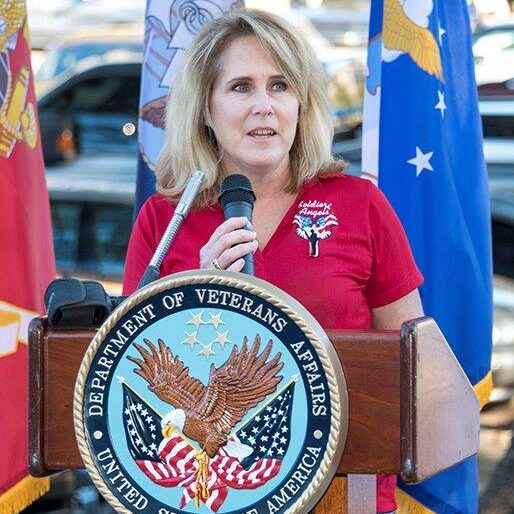
Nonprofit leaders need to have compassion and understanding above and beyond everything else. Not only for the Veterans we serve but for the volunteers.
– Vicki Sarracino
Did you serve in the military? If so, how long and what branch?
I did not serve in the military, but I am a military spouse of a 100% disabled Army Veteran. My husband retired in 2013 as a COL. He had 13 combat deployments over his 25-year career. Due to the many deployments, he was rated at 100% with PTSD.
What drew you to the work that you do and why do you think it’s important to serve the military community?
Not only was my husband in the Army, but my father was a Korean war Veteran who was also discharged with PTSD. Of course, at that time it was considered “Shell Shock”. My son was in the Air Force and I had many other family members in the military. What drew me to volunteer with an organization was the fact that we should be serving those who served. 1% volunteer to sacrifice not only themselves but their relationships with their families with the moves, separations, and results of deployments and injuries upon coming home. We owe them more than we can ever do.
What characteristics do you think are important for nonprofit leaders to have?
Nonprofit leaders need to have compassion and understanding above and beyond everything else. Not only for the Veterans we serve but for the volunteers. There are so many volunteers that give of their time and talents. No two volunteers are the same. You can’t speak with them all the same or direct them all the same. You need to understand why they do what they do and how they work best and adapt your leadership to meet their needs. Know what makes them tick.
Susie Turner, Team Support Volunteer Manager
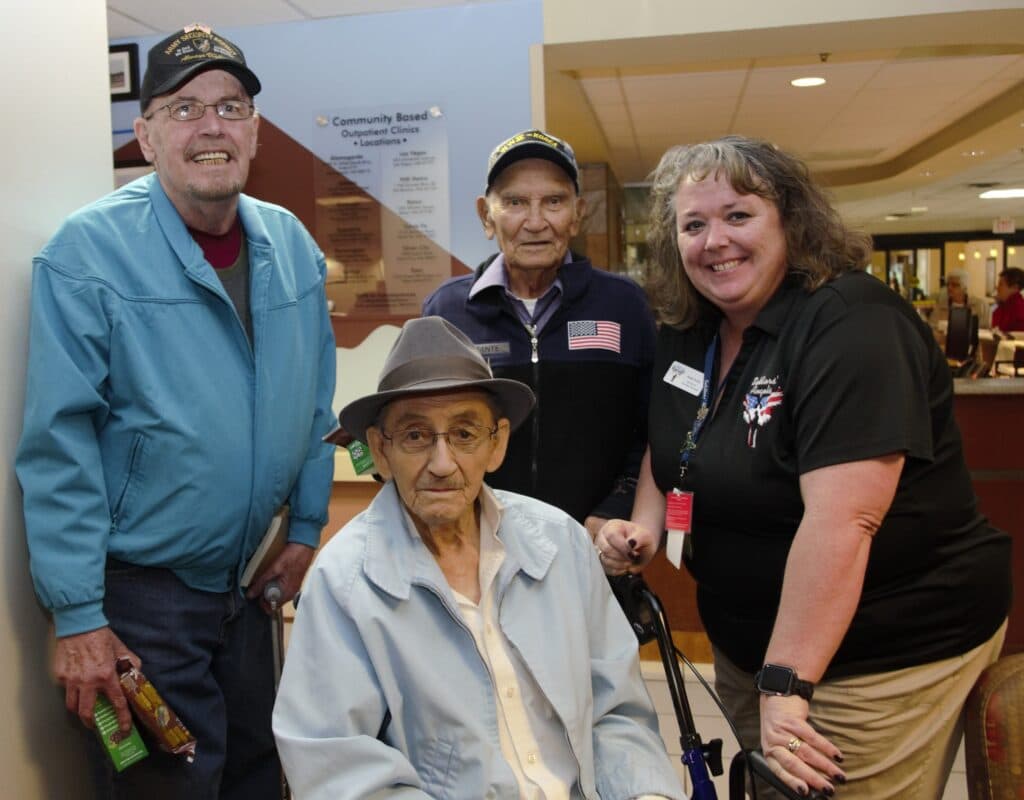
Our Team Support Volunteer Manager, Susie Turner, started volunteering with us in 2007 and started working for us in 2014. Susie is such an important part of our team as a welcoming volunteer manager who is always willing to answer questions and solve problems!
I love to help people and fix things, with the work that I do I get to help an angel find their place within Soldiers’ Angels helping them with their passion helps our military community.
– Susie Turner
Did you serve in the military? If so, how long and what branch?
I did not serve in the military, my father did serve way before I came along.
What drew you to the work that you do and why do you think it’s important to serve the military community?
I love to help people and fix things, with the work that I do I get to help an angel find their place within Soldiers’ Angels helping them with their passion helps our military community. I think it is important to say thank you to our military community (sometimes welcome home) and let them know that they are not forgotten, they are appreciated for their sacrifice and commitment, both those serving or have served as well as their families. They give up birthdays and holidays so that me and my family can have freedoms that so many do not have.
What characteristics do you think are important for nonprofit leaders to have?
I think nonprofit leaders should have listening skills, compassion, patience and adaptability.
Tracy Curran, Deployed Support Teams Program Manager
Tracy Curran, started volunteering with Soldiers’ Angels in early 2014. Tracy does a wonderful job balancing communications with deployed units and coordinating volunteer efforts to the MANY volunteers she supports.
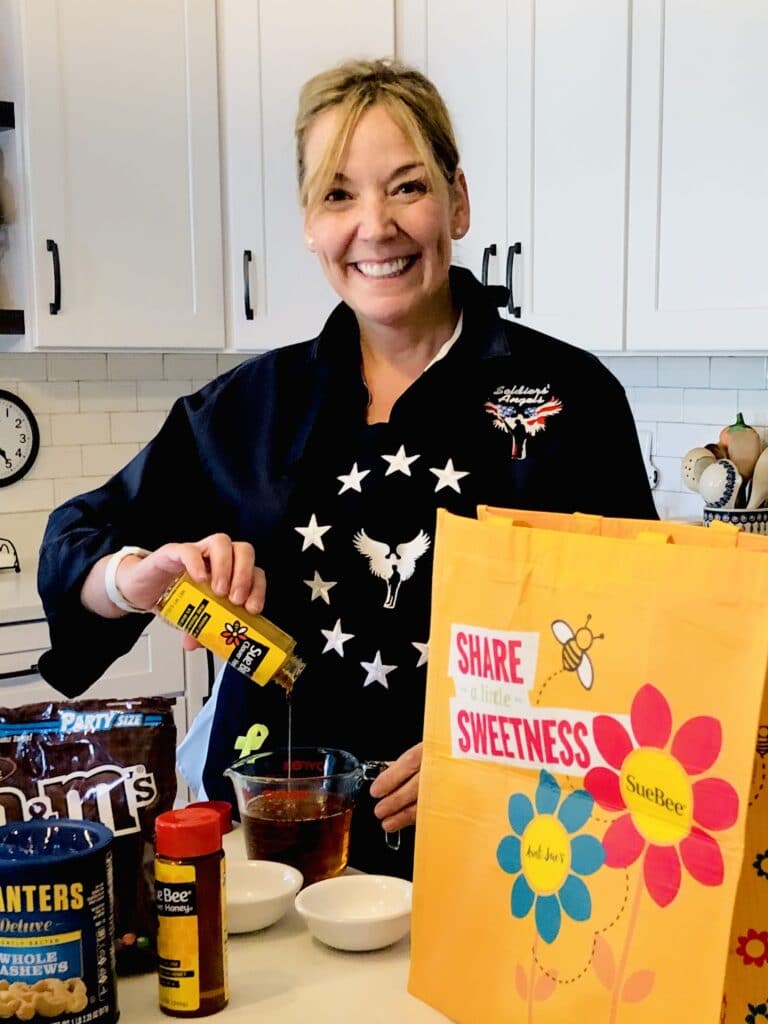
I believe a leader in a non-profit should not only have a passion for the work they do, but also gratitude and empathy for the cause supported.
– Tracy Currran
Did you serve in the military? If so, how long and what branch?
No, I was not active duty, but my husband served in the US Army for 26 years.
What drew you to the work that you do and why do you think it’s important to serve the military community?
Having been a military spouse, I have spent my entire adulthood volunteering for military organizations, serving from President to worker-bee and loving every second. When a friend told me about Soldiers’ Angels, I was drawn to the mission. At the time, my husband was deployed and had many Service Members serving under him who had little or no support from home. It was then, that I knew being part of Soldiers’ Angels was something I had to do. Knowing the difference the mission of Soldiers’ Angels makes to those serving our country now and those who have served in the past, and their families is why it’s important to me to give back.
What characteristics do you think are important for nonprofit leaders to have?
I believe a leader in a non-profit should not only have a passion for the work they do, but also gratitude and empathy for the cause supported.
Michelle Julazadeh Chavarin, Director of Marketing and Communications
Meet our Director of Marketing and Communications, Michelle Julazadeh Chavarin. Michelle is the woman behind ALL of the communications for Soldiers’ Angels and has been with us for eight years! From writing copy to creating graphics, updating the website, reaching out to the press, making sure our communications run smoothly… She does a lot behind the scenes and we are so grateful for her dedication, creativity, and hard work.
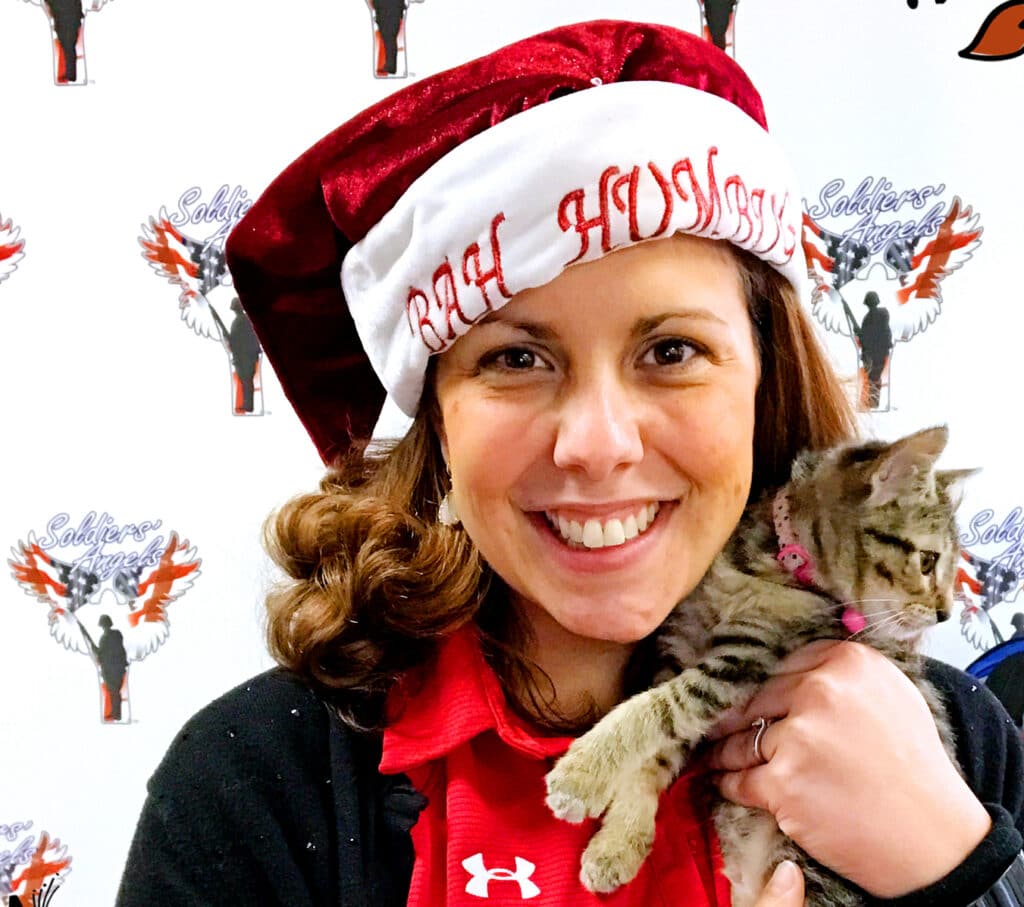
Seeing the anxiety in my mom when my brother was deployed and sensing her struggle to really know how she could support him compelled me to want to help carry out this valuable service for our Service Members.
– Michelle Julazadeh Chavarin
Did you serve in the military? If so, how long and what branch?
I did not serve in the military, however, my oldest brother is in the Air Force. He is 17 years older than me—so by the time I was old enough to start forming memories, he was already off to flight school. At that age, it’s hard to really grasp what the military is—I just knew that my brother flew really fast planes and was gone a lot.
What drew you to the work that you do and why do you think it’s important to serve the military community?
When my brother was deployed to combat zones, my mom never really knew the best way she could support him. She seemed almost frozen with the fear of what might happen to him. In addition, my husband is a technology contractor for the military and spent time on a contract in Kuwait. I witnessed him experience the same things our deployed experience— the initial excitement of the deployment that gradually transitions to missing every little detail about life at home, especially family. Since he was just a contractor, we were lucky enough that I was able to fly back and forth to Kuwait several times and stay with him for weeks at a time. That’s not something our military Service Members are able to do during most deployments. Once they are deployed, they are gone for months. So, having that little bit of experience really opened my eyes to the lives of our military families— many who experience decades of service and many deployments. These experiences compelled me to want to help carry out this valuable service for our Service Members. I have no doubt that my mom would have joined as an Angel and signed my brother up for support if Soldiers’ Angels was around in the 80’s and 90’s!
What characteristics do you think are important for nonprofit leaders to have?
Persistence, resilience, and creativity. As a communicator, it’s really easy to be hard on yourself when you feel like no one is listening or you have an unsuccessful campaign. But you have to keep going. Evaluate what you did, analyze how you think you can do better, then create a new path and keep moving forward.
We are so fortunate to have these passionate, caring, and dedicated women leaders on our team! Thank you, ladies, for all that you! You are truly #Herstory Makers in the military and nonprofit community!
